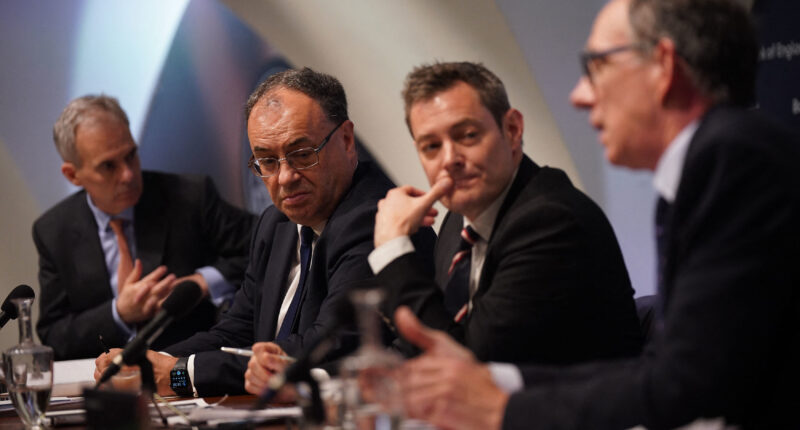MORTGAGE rates have soared over the past year but will they come back down?
Since the Bank of England began to hike the base rate in December 2021, lenders have been regularly pulling deals in their hundreds, replacing them with even higher rates.
For many first-time buyers, the dream of homeownership has evaporated as mortgages become less and less affordable.
And for homeowners, the shock of far higher monthly repayments when they need to remortgage has been crippling.
Will they keep going up and up? Or will they start to come back down later this year. We take a look.
Why have mortgage rates gone up?
The Bank of England has hiked the base rate 12 times so far since December 2021, from 0.1% all the way up to 4.5%.


It means mortgage lenders have to pay higher rates of interest to their savers as well as when they borrow from the money markets.
This has pushed up their “cost of funds” so they have passed their higher costs to customers by hiking mortgage rates.
How do higher mortgage rates affect me?
Borrowers on tracker mortgages and standard variable rates have seen their mortgage rate rise every time the Bank of England puts base rate up.
This has been very painful for millions of people, whose mortgage repayments have gone up by hundreds of pounds a month.
Most read in Money
Some people on fixed rate mortgages won’t have felt any change at all yet.
When their fixed rate ends though, they will have to remortgage or roll onto their lender’s standard variable rate.
The average standard variable rate is just under 8%.
Will I have to pay more on my mortgage?
Higher mortgage rates make monthly repayments higher.
Two years ago, you could get a two-year fixed rate mortgage for 0.99%.
On a £100,000 mortgage taken over 25 years this would have meant monthly repayments of £376.
If you were to borrow £100,000 over the same term at a typical two-year fixed rate of 5.72%, your monthly repayments would be £627.
When will mortgage rates stop going up?
So long as the Bank of England continues to put the base rate up, mortgages will keep getting more expensive.
The Bank’s aim is to bring inflation back under control after months of double digit price rises.
But it’s taking longer than experts thought it would.
That’s making markets wobbly because the longer inflation is high, the more the Bank of England will have to raise interest rates.
What will happen to mortgage rates now?
No-one can predict with any certainty if or when mortgage rates will change.
However, there are lots of factors that affect how lenders decide what rate to charge.
Broadly these include:
- UK inflation rate
- How much the UK economy is growing
- Market confidence
How inflation affects mortgage rates
If inflation is falling steadily, there is less pressure on the Bank of England to put the base rate up further.
This is because inflation is driven by demand.
The more money we have access to, the more we can spend.
When consumers and businesses spend more, prices tend to go up.
Billions of pounds was pumped into the economy during the pandemic.
All that extra money fuelled inflation and kept it over 10% for many months.
Supply chain disruption caused by global lockdowns, Brexit making international trading more expensive for the UK and Russia’s war in Ukraine have all added to inflation.
This is because each of these factors has restricted the supply of goods – be that energy, food or microchips.
Very high inflation happens when demand is high and supply low.
Raising interest rates makes it more expensive to borrow money, so we spend less.
That lowers demand and, the theory goes, prices drop.
This only works if supply stays the same or rises though.
The UK has very little control over import and export costs, oil and gas prices and the cost of moving goods around the world before they get to us.
It’s why inflation is still higher than the Bank of England wants it to be, because supply shortages mean prices are still rising.
How the economy affects mortgage rates
The economy is just another way of saying the money we spend, save, borrow, pay back and invest for the future.
It is governed by how confident we feel as individuals, families, businesses and in the public sector.
It’s also affected by how the rest of the world sees us and how confident they are in us.
When we feel confident we borrow money, buy homes, splurge on holidays.
Businesses borrow money to invest in better services and products, or to buy other businesses.
This generates economic growth, also known as GDP.
If we stop feeling confident and start to worry, we stop spending money and save it instead.
That stifles economic growth and if it carries on for a long time, it could mean the economy goes into recession – it shrinks.
What could bring mortgage rates down?
When the economic outlook is very uncertain or something unexpected happens, markets charge higher long-term interest rates.
It’s a knee-jerk reaction to build in a buffer to protect their future profits.
When measures such as inflation, GDP and consumer spending get more predictable markets charge lower long-term rates.
Lower long-term market rates mean lenders can afford to charge borrowers lower mortgage rates.
Will mortgage rates go down in 2023?
If the economy keeps growing and avoids recession, market confidence should stabilise.
David Hollingworth, associate director at L&C Mortgages, explains: “In recent months many would have expected that we were nearing the peak for base rate increases.
“That’s changed quickly, as higher than anticipated inflation figures has led forecasters to expect a need for interest rates to be hiked further.
“That’s caused volatility in mortgage rates and fixed rates are already being pushed up as a result.”
David says it looks likely that borrowers should brace for more interest rate rises from the Bank of England.
Before we can contemplate interest rates falling back, David explains mortgage rates have higher to climb.
He does offer a glimmer of hope though.
“Shorter term fixed rate pricing remains higher than for longer term deals,” he says.


“This signals that there is still an expectation for interest rates to ease back in the longer run.”
But he warns: “Until it looks like the Bank of England is taming stubborn inflation it could be premature to pin hopes on lower rates before next year.”









